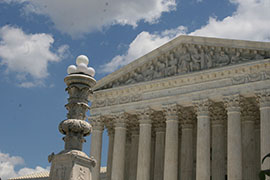- Slug: BC-CNS-Short Court,690
- File photo, video story available (thumbnail, caption below)
By DILLION EDDIE
Cronkite News
WASHINGTON – The Supreme Court began its new term this week with one judgeship empty for the first time in a generation, and just one Arizona case on the docket for the first time in several years.
The judgeship is easy to explain: The Senate has refused to consider President Barack Obama’s nomination of Judge Merrick Garland to replace Justice Antonin Scalia, who died suddenly in February. Senate leaders have said the appointment should be made by the next president.
The lack of Arizona cases is harder to explain but not surprising to legal experts, who say it is a return to the norm after several years in which the state fought high-profile battles over immigration, voting rights, redistricting and more.
“Arizona has curiously a history of having more importance in Supreme Court cases per capita when compared to similar states,” said Paul Bender, a law professor at Arizona State University’s Sandra Day O’Connor College of Law.
In recent years, the justices have considered SB 1070, the state’s tough “papers please” immigration law; heard two challenges to its execution protocols; and heard a First Amendment challenge from a church to a Gilbert sign ordinance.
The court has also let stand lower court rulings that rejected the state’s strict ID requirement for voter registration, overturned a ban on abortions after 20 weeks and declared its ban on bail for illegal immigrants unconstitutional.
By contrast, the short-handed court has only agreed to hear one case out of Arizona this term, a challenge to fines assessed in a lawsuit by a family that successfully sued Goodyear after one of its tires failed on their motorhome, causing a crash. The company and its attorneys were subsequently fined and are challenging the imposition of those penalties.
Bender said one reason the state has had a disproportionate presence before the high court in recent years could be due to the “very extreme” laws that have come out of the state in that time.
“The reason is largely because the Arizona legislature has done some very extreme things in the areas of immigration for example or redistricting,” Bender said.
Even though the court has only agreed to hear one case out of Arizona, it does not mean there will not be other cases directly affecting the state, experts said.
The court on Monday denied a White House request to reconsider their split decision last term on a case involving President Barack Obama’s proposed expansion of the administration’s deferred deportation policies. The split decision let stand a Texas ruling that put the policies on hold, and Monday’s action reaffirmed the lower court.
“Even though this case originated from Texas, it still has tremendous impact on the state of Arizona,” said Andrew Coan, a law professor at the University of Arizona’s James E. Rogers College of Law.
And there are at least a couple of cases in the pipeline out of Arizona that could end up in front of the court before it ends its term next summer.
Bender pointed to cases “from Arizona challenging restrictive abortions legislation” as possible high court cases. One is currently pending in the 9th U.S. Circuit Court of Appeals and the other has been decided by the circuit court and could be petitioned to the Supreme Court, he said.
“The likelihood of there being more cases from Arizona added to this year’s docket is fair,” Coan said.
But even if it takes on a full slate of cases, it looks as if the court will be hearing them with a short bench of justices. Even if Senate Republican leaders agreed to have confirmation hearings on Garland it could be months before his nomination was approved.
“The most obvious possibility for the ninth pick is Merrick Garland,” said Bender.
But he and others said that could change depending on the outcome of the Nov. 8 elections. A win by Democrat Hillary Clinton could keep Garland in the running or could lead to a more liberal candidate, while Republican Donald Trump would almost certainly nominate someone more conservative than Garland.
“There’s a real possibility of big changes,” said Bender.
^__=
Web links:
_ Goodyear case petition: http://www.scotusblog.com/wp-content/uploads/2016/05/15-1406-Goodyear-v.-Haeger-Petition-For-A-Writ-Of-Certiorari-appendix-omitted….pdf
_ Reed v. Town of Gilbert: https://www.supremecourt.gov/opinions/14pdf/13-502_9olb.pdf
_ Execution protocols ruling: https://www.supremecourt.gov/opinions/14pdf/14-7955_aplc.pdf
_ Redistricting ruling: https://www.supremecourt.gov/opinions/14pdf/13-1314_kjfl.pdf
_ Voter registration case: https://www.supremecourt.gov/opinions/12pdf/12-71_7l48.pdf
_ SB 1070 ruling: https://www.supremecourt.gov/opinions/11pdf/11-182.pdf
^__=
After years of an outsized presence before the U.S. Supreme Court, Arizona stars the latest term with just one case currently before the justices, though experts say more cases are likely to be added in the coming months. (Photo by Soyenixe Lopez/Cronkite News)
